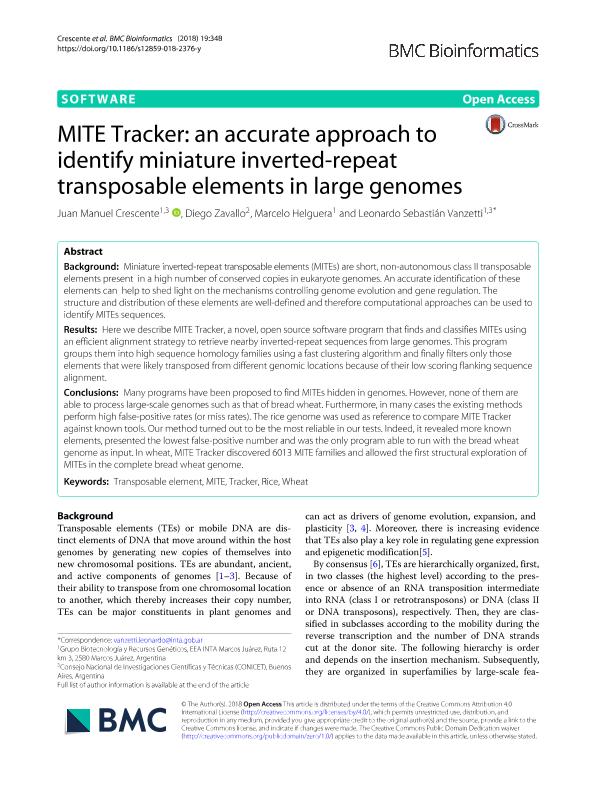Artículo
MITE Tracker: An accurate approach to identify miniature inverted-repeat transposable elements in large genomes
Fecha de publicación:
10/2018
Editorial:
BioMed Central
Revista:
BMC Bioinformatics
ISSN:
1471-2105
Idioma:
Inglés
Tipo de recurso:
Artículo publicado
Clasificación temática:
Resumen
Background: Miniature inverted-repeat transposable elements (MITEs) are short, non-autonomous class II transposable elements present in a high number of conserved copies in eukaryote genomes. An accurate identification of these elements can help to shed light on the mechanisms controlling genome evolution and gene regulation. The structure and distribution of these elements are well-defined and therefore computational approaches can be used to identify MITEs sequences. Results: Here we describe MITE Tracker, a novel, open source software program that finds and classifies MITEs using an efficient alignment strategy to retrieve nearby inverted-repeat sequences from large genomes. This program groups them into high sequence homology families using a fast clustering algorithm and finally filters only those elements that were likely transposed from different genomic locations because of their low scoring flanking sequence alignment. Conclusions: Many programs have been proposed to find MITEs hidden in genomes. However, none of them are able to process large-scale genomes such as that of bread wheat. Furthermore, in many cases the existing methods perform high false-positive rates (or miss rates). The rice genome was used as reference to compare MITE Tracker against known tools. Our method turned out to be the most reliable in our tests. Indeed, it revealed more known elements, presented the lowest false-positive number and was the only program able to run with the bread wheat genome as input. In wheat, MITE Tracker discovered 6013 MITE families and allowed the first structural exploration of MITEs in the complete bread wheat genome.
Palabras clave:
MITE
,
RICE
,
TRACKER
,
TRANSPOSABLE ELEMENT
,
WHEAT
Archivos asociados
Licencia
Identificadores
Colecciones
Articulos(CCT - CORDOBA)
Articulos de CTRO.CIENTIFICO TECNOL.CONICET - CORDOBA
Articulos de CTRO.CIENTIFICO TECNOL.CONICET - CORDOBA
Articulos(SEDE CENTRAL)
Articulos de SEDE CENTRAL
Articulos de SEDE CENTRAL
Citación
Crescente, Juan Manuel; Zavallo, Diego; Helguera, Marcelo; Vanzetti, Leonardo Sebastián; MITE Tracker: An accurate approach to identify miniature inverted-repeat transposable elements in large genomes; BioMed Central; BMC Bioinformatics; 19; 1; 10-2018; 1-10
Compartir
Altmétricas




